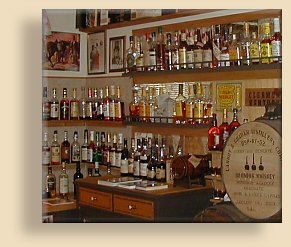American
Whiskey
FRIDAY
-
OCTOBER
20,
2000
THIS IS SUCH a beautiful weekend that John wanted to get a head start
on our annual shopping and autumn foliage viewing trip. At work this morning
he manages to find two people to take his afternoon duty so he can take off
for a half-day vacation. We knew that Mike Veach was planning on meeting
with Greg and Jo Kitzmiller this evening at D.Marie's in Louisville, so after
doing some last-minute planning we called Mike to arrange meeting up with
them there. We head out around 4:00 to see the fall leaves and do us some
bourbon shopping.
We immediately run into trouble, in the form of heavy traffic on I-75. This
is not just your everyday rush-hour traffic; it’s a total standstill.
We finally leave the freeway at Union Centre, only to find traffic jammed
up everywhere. By the time we get back on I-75, the traffic is better, but
we’ve lost about half an hour or more. More traffic through Erlanger,
Florence, and Richwood lasts nearly all the way to the I-71/75 split and
brings us to the Warsaw exit about an hour and a half later than we’d
planned. The "pleasant ride along beautiful, fall-leaved, country roads"
has now become a high-pressure, concentrated rush. Squinting into the setting
sun, we race past the silhouettes of the lovely autumn trees we’d come
to see. Tempers on edge, we pass non-stop through the two or three towns
with liquor stores we’d wanted to visit, knowing we won’t have
time to spend looking through them. We don’t even stop to secure a motel
room in Jeffersonville (across the river from Louisville) as we’d planned;
it turns out to be a good thing, as we will learn later.
We arrive at the Galt House hotel in Louisville at around 8:00, taking the
elevator to D. Marie’s Bar on the 25th floor where we join Mike, Greg,
and Jo who had, themselves, arrived only a few minutes earlier. Julian Van
Winkle and Brenda Piercefield were supposed to be there as well, but they
didn’t make it. In fact, the reason the other three were late was that
they’d been visiting with Julian and his sister Sally at the Party Mart,
a liquor store where she was holding a signing session for her book. Julian
was giving samples of his bourbon there, too, taking advantage of a recent
change in Kentucky law.
D.Marie’s is Mike’s favorite hangout, and his equivalent of our
bourbon room downstairs. It’s easy to see why. The lounge is dedicated
to the bourbon enthusiast who wants to explore and compare different brands.
In that respect, you could hardly imagine a better environment. First of
all, they have what they claim is the largest selection of bourbon whiskey
in America, and we can easily believe it. Their list, which covers two pages
(small print; single space) in their guest handout brochure features over
120 brands, and they’re all on display behind the bar. Also on display
behind the bar (and other locations in the room) is a breathtaking panoramic
view of Louisville, as seen from twenty five stories up. The back bar and
the "pit" are built low so that the view is not obstructed. The brochure
also features a brief history and description of bourbon. The prices are
very reasonable for the grade of bourbons being offered, ranging from $4.00
for about half the brands to $5.50 - $6.50 for most of the others, with just
a few really rare and expensive brands going for $8.00, $14.00 and $28.00
a serving. They also offer what they call tasting portions, which are ½
ounce servings of two or more brands, for half-price. The staff is first-class
all the way. Our bartender, Kathy (or Kate), is a bright young lady who gives
the impression that she knows more about bourbon than she actually admits
to. She also has an entertainer’s knack for knowing just when to become
part of the conversation and to just what degree. When we have visitors to
our home and we’re tasting from our collection, we’d be honored
and complimented if they left feeling as well-hosted as we feel at Kate’s
place (and we don’t even charge our guests).
With a degree in hotel and restaurant management, Kate is always on the lookout
for opportunities to expand into marketing, and specifically beverage marketing.
She mentions this to us in conversation, and Greg just lights up. Greg’s
an instructor and lecturer of Marketing at Indiana University, and a
writer/lecturer on international food and beverage marketing. Needless to
say, they have lots to talk about beyond just what bourbons we’re all
drinking.
And the bourbons we we’re all drinking…
Well, Mike has a commitment to Linn Spencer to do a web-publishable tasting
of Wild Turkey Kentucky Spirit and another for Elmer T. Lee Single Barrel,
so he does those pretty seriously without getting involved in tasting other
brands until he’s finished. Greg and Jo are tasting brands they
haven’t tried before, as well as a few they have tried and really, really
liked. That’s exactly what we do, too. Brands we get to taste for the
first time include: Pappy Van Winkle
We also try some that we are already familiar with, mainly to allow the others
to taste them. They are Old Bourbon Hollow 100-proof bottled-in-bond and
Original Barrel Brand 107-proof. Both are officially declared "pooh-pooh"
by everyone else.
We play "Stump the Veach", and offer a selection that becomes only the second
one to ever succeed in stumping Mike’s powers of identification. The
bourbon is Bulleit Thoroughbred 100-proof (not the current Bulleit Frontier
Bourbon made by Four Roses). We give Mike the clue that it is no longer being
made and even offer a "half-prize" honorable mention if he can determine
the distillery (another of Mike’s talents). We stump him on both counts.
Unable to identify the bourbon, he offers that it must have been made by
Jim Beam. The old Bulleit (both the Thoroughbred and a 90-proof offering)
were produced by Ancient Age until just a couple years ago. Although, with
Mike’s talent and knowledge, and the propensity of distillers to move
product back and forth among themselves, we would not be at all surprised
if we later learn that Ancient Age just happened to bottle this particular
brand with some whiskey they’d acquired from Jim Beam!
We mention that we’ve not yet arranged for a place to stay tonight,
and Greg suggests we try the Holiday Inn in Shively, where they’re staying.
We had intended to start right out heading north through Indiana tomorrow
and had hoped to get a motel closer to our route, but our minds change instantly
when Mike offers to take us with them for a tour of the old Shively distilleries
tomorrow morning. I quickly call the Holiday Inn and secure a reservation,
taking Greg’s suggestion to use him as a reference in getting a discounted
rate. That’s how we manage to get a lovely room for only thirty-five
dollars. We don’t get to sleep in it very long, though, as we end up
staying at D.Marie’s until nearly half past midnight.
SATURDAY -
OCTOBER
21,
2000
Mike meets us in the lobby and we all head out to pile into his jeep. We’ve
had really lovely, warm, sunny weather for the past several days, but today
it’s overcast and quite cool. That makes riding in the open jeep a little
chilly, but not really uncomfortable. Also, except for Jo, we’re all
none too skinny. Somehow John’s lucky enough to be appointed shotgun
rider, leaving Greg, Jo, and Linda to squeeze into the back seat. No one
complained, though.
Mike grew up in Shively, and he knows the place intimately as a lifetime
resident, not just as an historian specializing in old Kentucky distilleries,
many of which were located here. With the exception of Early Times, which
we really don’t see since the gate is locked and you can’t see
much from that location, most of these old places are either abandoned, empty
shells or are being used by other manufacturing outfits.
The first place we visit is the site of Glencoe, which was originally the
Stitzel Distillery until Phil Stitzel and his brother Fred built the Stitzel
Brothers Distillery in 1906. When that happened this plant was sold to Phil
Hollenbeck and one William LaRue Weller (who would later form even closer
ties to Phil Stitzel, resulting in the distillery that will be our next stop).
They made the Glencoe brand here, along with Fortuna and one or two others.
The building looks like an abandoned shell now.
Mike next takes us to the site of the Stitzel-Weller Distillery. Besides
being physically located closeby, it also makes for a good historic and logical
"next destination". The sons of the builder of Glencoe had sold it and built
a distillery of their own. And although there is no longer any trace of the
A. Ph. Stitzel Distillery, Phil and Fred Stitzel operated it for nearly thirty
years, right through prohibition (as a producer of medicinal whiskey).
In fact, it never did close.
From here, we drive down Ralph Avenue to the corner of Dixie Highway and
stop to take some pictures of the three or four remaining brick warehouses
of the old Four Roses distillery. Then we move on to Early Times, just a
couple hundred yards up the street. It’s Saturday and the gate is locked,
so we aren’t able to drive in to where any pictures could be taken.
From here, Mike drives us to an industrial area where we turn down a short
gravel access road to a parking area where we can see, all around us, no
less than four plants that had once been well-known bourbon distilleries. Directly
in front of us stands a group of buildings where people are going in and
out to work. Whatever the buildings are being used for today, this was once
the site of Hill and Hill, a well-known bourbon distillery that John remembers
from as recently as maybe twenty-five years ago. Mike
explains that they had both brick and iron-clad warehouses, and examples
of both are still standing. The iron-clads are obviously abandoned, but the
brick buildings appear to be in use.
From here we can also see some of the brick warehouses of the Seagram’s
distillery, and the remaining iron-clads of the old Yellowstone plant. As
we leave, we stop at the head of this gravel road to get a good look at the
original Bernheim distillery,
From Bernheim, we drive out to the front part of two of the distilleries
we’d just seen. We visit the beautiful, Roman-columned, limestone marble
faced office of whatever now occupies the old Seagram’s main office.
As Greg and John are poking around taking pictures, a gentleman from the
plant approaches to see what we’re doing and we explain our purpose. He
tells us that they now use this facility only to make vinegar and wine. The
vinegar accounts for the stainless steel tanks seen around the main buildings,
and the wine production is growing steadily, amounting to 275,000 gallons last
year. As we move over toward the jeep, Mike introduces himself and they find
that they are both United Distillers’ alumni. It’s amazing how many other people
in this business belong to that embittered club, as they rattle
Driving back to the Holiday Inn, we pass a couple more of
Shively’s distillery ghosts, finally arriving in time for Greg and Jo to begin
the rest of their trip, which was supposed to have started some two hours ago.
We say goodbye to them, and then accompany
GHOSTS
of
WHISKIES
PAST
The
Shively
Distilleries and
Mike
Veach's
Distillery
Tour
Jefferson Reserve
John doesn’t care much for this
bourbon, but Linda likes it.
Sam Houston
Linda doesn’t care for this one at all, but John likes it (at
least more than the Jefferson Reserve). He doesn’t think it’s worth
the price, though.
Twisted Spoke
This is a semi-private bottling named for the Twisted Spoke Bar in
Chicago. This is some of Julian’s wheat whiskey and the taste is easily
identifiable as such. Very, very good bourbon, despite the odd name that
conjures up images of greasy, tattooed, leather-jacketed motorcycle people.
It's obvious that they're greasy, tattooed, leather-jacketed motorcycle
people with class
American Biker
Here’s another bourbon with a motorcycle-theme name, but this
one is radically different from Twisted Spoke. It’s a younger, fresher
bourbon, with some heat to it. But it also has another quality, and one that
John finds hard to reconcile with his vision of Dennis Hopper and Peter Fonda
getting their motors running and heading out on the highway… when he
drinks American Biker and closes his eyes, John says he feels like he just
walked into the ladies’ room by mistake! The first thought that comes
to his mind is LAVENDER, the same aroma that practically defines a
soap’n’candle shop. The idea of American bikers browsing through
any store that contained this aroma is so foreign to him that he almost has
to laugh ("Yes," says John, "I know I’m admitting to a prejudiced viewpoint;
it’s my own prejudices that I’m laughing at – not the bikers").
He doesn’t really care for it much, although he gives it credit it for
being a unique flavor expression. Linda also thinks the taste is too floral
for her, but probably there are others who would. John isn’t sure the
"American Biker" label is the best marketing strategy for this whiskey,
though.
Family Reserve 20-year-oldThis isn't the Pappy Reserve that many have considered the finest
bourbon in the world for many years. There is, unfortunately, no more of
that bourbon left. This is the NEW Pappy, which Julian had
introduced us to when we visited him at his Old Commonwealth Distillery
this last spring, and which we tasted in September at the Bourbon Festival
gala. Julian Van Winkle left
D.Marie's a preview bottle of it when
he was last here, since it won’t be officially released until December.
We all notice that it still has the same label with nothing to indicate that
it’s such an entirely different bourbon.
John says you don't even have to drink this bourbon to be blown away by
it; you need only pass the glass under your nose every once in awhile. Jo's
comment after tasting her first sip (this time around that is; it's the second
time she's tasted it) is just simply, "WOW!". Well, that pretty much
captures everyone's opinion.
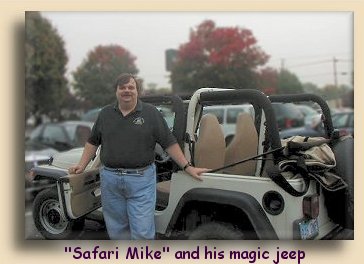 DESPITE
GETTING to sleep so late, this morning we wake up earlier than we need
to in order to meet everyone at 10:00 for our tour. After breakfast at the
hotel restuarant, Linda walks a couple laps around the hotel parking lot
for exercise (John’s idea of morning exercise is to walk the remote
control a couple laps around the available channels).
DESPITE
GETTING to sleep so late, this morning we wake up earlier than we need
to in order to meet everyone at 10:00 for our tour. After breakfast at the
hotel restuarant, Linda walks a couple laps around the hotel parking lot
for exercise (John’s idea of morning exercise is to walk the remote
control a couple laps around the available channels).
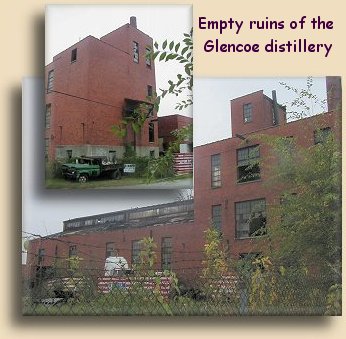 We
start out with a quick tour of the neighborhood where Mike grew up. Small
but nice single working-class homes with lawns, not unlike the ones John
remembers from his childhood in Carlsbad. Well, these are about ten years
newer, but it’s been longer than that since he’s seen those, either.
We
start out with a quick tour of the neighborhood where Mike grew up. Small
but nice single working-class homes with lawns, not unlike the ones John
remembers from his childhood in Carlsbad. Well, these are about ten years
newer, but it’s been longer than that since he’s seen those, either.
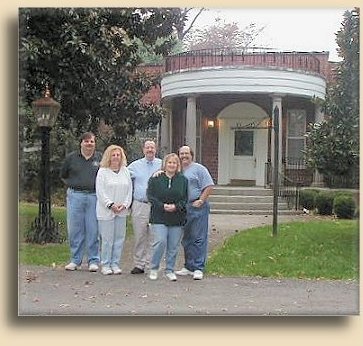 During
that time a strong bond was formed with W. L. Weller and this resulted in
the creation of the Stitzel-Weller Distillery, just off Ralph Street, which
opened for business on Derby Day, 1935. There are few, if any, locations
in the world of bourbon that are more revered than this distillery. It
wasn’t that it was the last to go; several other well-known distilleries
have vanished since then. In fact, the decades following brought several
upheavals of equal or greater impact (Old Crow, Old Grand Dad, Old Taylor,
Glenmore, to name a few). And they all made first-class bourbon, just as
Stitzel-Weller did. But the sale of Stitzel-Weller to Somerset (a division
of Norton-Simon) in 1972 was (and continues to be) felt in a deeper part
of the bourbon-lover’s heart than nearly any other event in modern bourbon
history. No matter that the plant continued to produce bourbon for the next
twenty years, that fateful day when ownership transferred out of the Van
Winkle family was "the day the music died" for Stitzel-Weller, and in the
hearts of the bourbon world the distillery might just as well have closed
down right then and there.
During
that time a strong bond was formed with W. L. Weller and this resulted in
the creation of the Stitzel-Weller Distillery, just off Ralph Street, which
opened for business on Derby Day, 1935. There are few, if any, locations
in the world of bourbon that are more revered than this distillery. It
wasn’t that it was the last to go; several other well-known distilleries
have vanished since then. In fact, the decades following brought several
upheavals of equal or greater impact (Old Crow, Old Grand Dad, Old Taylor,
Glenmore, to name a few). And they all made first-class bourbon, just as
Stitzel-Weller did. But the sale of Stitzel-Weller to Somerset (a division
of Norton-Simon) in 1972 was (and continues to be) felt in a deeper part
of the bourbon-lover’s heart than nearly any other event in modern bourbon
history. No matter that the plant continued to produce bourbon for the next
twenty years, that fateful day when ownership transferred out of the Van
Winkle family was "the day the music died" for Stitzel-Weller, and in the
hearts of the bourbon world the distillery might just as well have closed
down right then and there.
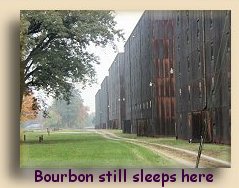 Although
the beautiful old all-copper still ceased operations in 1992, Stitzel-Weller
is still in daily use as a storage and warehousing facility. And it’s
every bit as much the home of 12-year-old Old Fitzgerald or Old Weller Antique
(which is older than the claimed 7 seven summers) as it ever was. But the
heart of the distillery is dead. The production facilities are abandoned,
and they look every bit as much so as do the ones at Old Crow or Old Taylor
(which closed only a few years earlier in the ‘80s).
Although
the beautiful old all-copper still ceased operations in 1992, Stitzel-Weller
is still in daily use as a storage and warehousing facility. And it’s
every bit as much the home of 12-year-old Old Fitzgerald or Old Weller Antique
(which is older than the claimed 7 seven summers) as it ever was. But the
heart of the distillery is dead. The production facilities are abandoned,
and they look every bit as much so as do the ones at Old Crow or Old Taylor
(which closed only a few years earlier in the ‘80s).
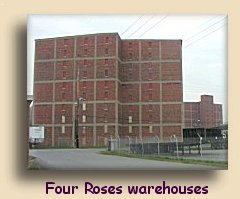 There
is a wonderful aroma that fills the air of an active distillery and brings
a sense of joy with every breath. There is no such aroma at Stitzel-Weller
any longer, but the smell of the history in this place is just as overpowering.
There
is a wonderful aroma that fills the air of an active distillery and brings
a sense of joy with every breath. There is no such aroma at Stitzel-Weller
any longer, but the smell of the history in this place is just as overpowering.
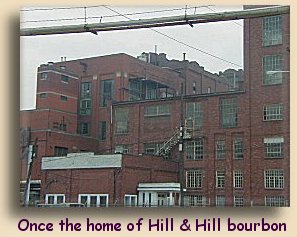 We’ve been here before (see
our visit to Early Times), but it’s too bad that Greg and Jo couldn’t see
more of it. Maybe they’ll have another chance later, during the week when they
might also get a chance to meet production manager Glen Glaser.
We’ve been here before (see
our visit to Early Times), but it’s too bad that Greg and Jo couldn’t see
more of it. Maybe they’ll have another chance later, during the week when they
might also get a chance to meet production manager Glen Glaser.
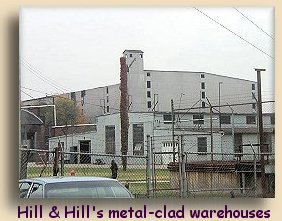 now owned by the Dant-Clay
corporation. In fact, Mike drives a few yards up Bernheim Road and parks near
the railroad tracks so we can see the same scene of Bernheim and the tracks as
shown in a famous photograph from the turn of the last century. Naturally, we
take modern photos to match.
now owned by the Dant-Clay
corporation. In fact, Mike drives a few yards up Bernheim Road and parks near
the railroad tracks so we can see the same scene of Bernheim and the tracks as
shown in a famous photograph from the turn of the last century. Naturally, we
take modern photos to match.
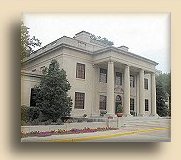 We
then drive only a short distance past the adult video stores, strip bars,
pawn shops, and quick check cashing stores to the site of the old Yellowstone
distillery. Yellowstone Bourbon, originally the flagship label of the Cold
Springs Distillery in Gethsemane, was made by J.B. Dant as early as 1865 and
later by Taylor & Williams. It did not survive Prohibition, but
We
then drive only a short distance past the adult video stores, strip bars,
pawn shops, and quick check cashing stores to the site of the old Yellowstone
distillery. Yellowstone Bourbon, originally the flagship label of the Cold
Springs Distillery in Gethsemane, was made by J.B. Dant as early as 1865 and
later by Taylor & Williams. It did not survive Prohibition, but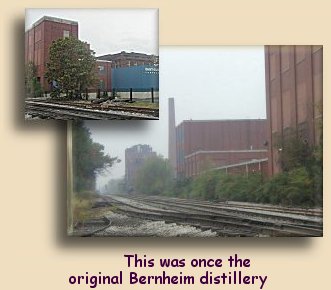 soon after Repeal, the family revived it at this Louisville location. In 1944
both the label and the distillery were purchased by Glenmore. Yellowstone was
one of the premier bourbons of Kentucky, and indeed during the ‘60s it was said
to be the leading bourbon sold in Kentucky for most of the decade. In the early
1970’s, Glenmore shut down distilling operations at their Owensboro plant and
all Glenmore distilling was done here until this facility closed in 1991. It is
now owned by the Florida Citrus Distillers corporation, and only a couple of the
main buildings and two of the original warehouses remain.
soon after Repeal, the family revived it at this Louisville location. In 1944
both the label and the distillery were purchased by Glenmore. Yellowstone was
one of the premier bourbons of Kentucky, and indeed during the ‘60s it was said
to be the leading bourbon sold in Kentucky for most of the decade. In the early
1970’s, Glenmore shut down distilling operations at their Owensboro plant and
all Glenmore distilling was done here until this facility closed in 1991. It is
now owned by the Florida Citrus Distillers corporation, and only a couple of the
main buildings and two of the original warehouses remain.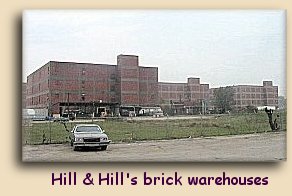
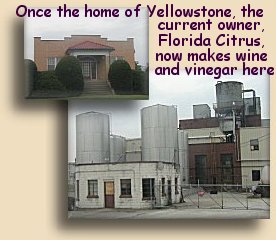 off
names back and forth of people they both know.
off
names back and forth of people they both know.
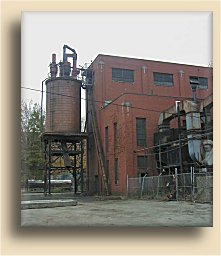 Mike
next door to the Liquor Outlet store, where we find nothing new or interesting
but Mike is able to get a bottle of Old Forester that he needs. We then bid
adieu to Mike and thank him (as if we could thank him enough) for the wonderful
tour today and for turning us on to D.Marie’s, which is every bit the wonderful
place he said it was.
Mike
next door to the Liquor Outlet store, where we find nothing new or interesting
but Mike is able to get a bottle of Old Forester that he needs. We then bid
adieu to Mike and thank him (as if we could thank him enough) for the wonderful
tour today and for turning us on to D.Marie’s, which is every bit the wonderful
place he said it was.
![]()
